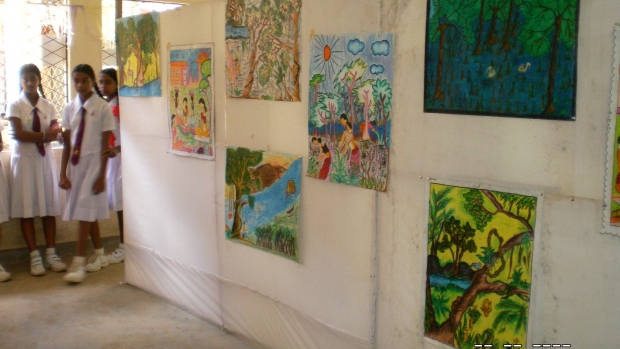Grants :: Small Grant Facilities :: Building capacity of schoolchildren as a forerunner to sustainable mangrove ecosystem conservation initiatives (Phase 2)
Building capacity of schoolchildren as a forerunner to sustainable mangrove ecosystem conservation initiatives (Phase 2)

Building capacity for schoolchildren Ph2 , Sri Lanka © Visura Devt Fdn , 2010
Objectives
This project had three main objectives:
- to enhance knowledge and understanding among schoolchildren of identifying mangrove species, the uses of mangrove products, and different methods of sustainable consumption and conservation of mangroves;
- to help GCE A-level students conduct research projects on mangrove ecosystems; and
- to enhance students’ capacity to promote environmental awareness by sponsoring activities focusing on the conservation of mangrove ecosystems.
Background
Schoolchildren are said to be the main messengers of information to their household, so this project sought to raise awareness of mangrove conservation and its importance among children in schools. This was achieved at two levels using simple awareness promotion tools. Advanced students carried out research studies on mangrove ecosystems, and an Environmental Conservation Unit was formed to lead students in carrying out the environmental programme during the project period.
Target beneficiaries
Schoolchildren from Mawadala Baminiyanwila Jayanthi School in the RUK area.
Outputs
- Delivery of a series of awareness programmes on mangrove use and conservation.
- Delivery of guidance programmes on developing and implementing simple research projects on mangrove ecosystems.
- Formation of a School Environmental Conservation Unit.
- Organization of an environmental education study tour to increase children’s exposure to the subject matter and create links to government authorities.
- Mounting of an exhibition for the project completion meeting.
Accomplishments and challenges
After conducting various awareness programmes, and establishing a school environmental management unit, the target schoolchildren are now much more aware of the importance of mangroves.
Challenges
These included the short duration of the project, and the fact that it coincided with the end-of-year school exams, which drew students’ attention away from project activities. Also, the school selected for the project was in an underdeveloped area and suffered from a high level of student absenteeism.
Contributions to cross-cutting themes
Gender equality
The project involved all schoolchildren in the target school irrespective of whether they were boys or girls.
Lessons Learned
It is possible to change schoolchildren’s attitudes through awareness programmes highlighting the importance of protecting their environment. Such programmes can encourage students to take more interest and play a greater role in environmental conservation initiatives. As a result of the project, the target schoolchildren have been able to learn about the value of a healthy natural environment.
Project Facts
Country
Location
Rekawa, Ussangoda and Kalametiya (RUK) area, Sri Lanka
Topic
Duration
1st Oct 2009 to 30th Nov 2009
MFF Grant Amount
US$3,311
Implementing Partner
Visura Development Foundation
Weeraba Pirivena, Nupe,
Matara, Sri Lanka
Tel: +94 41 2230671
